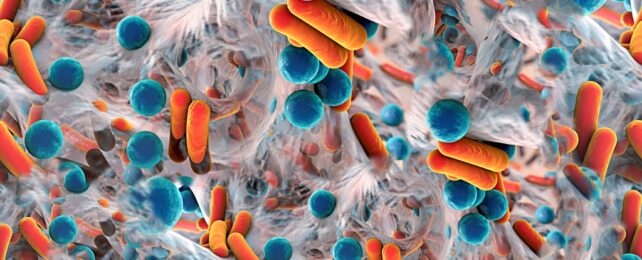The microbes that live in your gut are having their moment in the sun. Even if you haven't been following the research, you can't have missed the hundreds of adverts for probiotics and prebiotics, aimed at selling you products to keep your microbiome healthy.
Other microbiomes have also recently been discovered, and these too play an important role in your health. Your mouth, nasal cavity, skin and scalp all have their own unique microbiomes. Some have even proposed that the brain has its own microbiome.
The idea that the brain has a microbiome was first suggested in 2013, but it didn't get much attention. This is mostly due to the longstanding belief that the brain is a sterile organ, shielded from the rest of the body and from harmful agents that are circulating in our blood.
It is also difficult to confirm the presence of microbes. The techniques used rely on analysing foreign genetic material, which can be unreliable because these fragments of DNA could be the result of contamination.
In healthy brains, the so-called "blood-brain barrier" shields the brain from the blood and any harmful substances dissolved in it. However, during ageing and in neurological diseases such as Alzheimer's disease, this protective barrier becomes leaky and blood and harmful substances can enter the brain.
This can cause diseases and further worsen the damage that has already occurred. Similarly, the immune system also becomes less effective as we age. This could also contribute to the presence of microorganisms throughout the body that might have been cleared away by immune cells in younger people.
The previously mentioned 2013 study investigated whether microbes can invade the brains of people with HIV/ AIDS. They compared brain tissue of people with HIV/AIDS to brain tissue of people without HIV/AIDS.
Surprisingly, they found non-human genetic material that pointed to the presence of more than 173 types of bacteria and phages ( viruses that infect bacteria) in the brains they studied.
All brain samples tested, taken from patients with different brain disorders, not just people with HIV/AIDS, appeared to have bacterial genetic material in them.
A group of researchers from the University of Edinburgh compared the brains of people with Alzheimer's disease to healthy brains. The brains of people with Alzheimer's harboured more bacteria and fungi than healthy people. But they did find several species of fungi, bacteria and other microorganisms in healthy brains.
The human brain microbiome was found to be a subset (about 20%) of the gut microbiome. Although more bacteria were found in the brains of people with Alzheimer's, the researchers were not able to find a pattern of certain bacteria that were only found in diseased brains.
However, this study has yet to be peer-reviewed and published in a scientific journal, so the results should be treated with some caution.
Questions remain
We still do not have a clear idea of how the microorganisms can enter the brain.
One theory proposes that diseases of the mouth, such as gum disease or tooth decay, cause tissue damage that then allows the bacteria that are normally found in the mouth to travel to the brain via the nervous system.
Interestingly, the oral bacteria are able to produce amyloid proteins. This is a protein important in normal brain function but abnormal clumps of it are found in people with Alzheimer's. Bacteria from the mouth might hence invade the brain where they could cause disease.
The brain microbiome is a recent and captivating idea. With the advances seen in molecular techniques, such as new sequencing technology which help us to understand the genetic code of the microorganisms, more microbes will be discovered across the whole body.
It appears that similar to the gut microbiome, a disturbance in the fine balance of which microbes are present can lead to disease. Nevertheless, this discovery opens the door to new potential therapy options for brain diseases such as Alzheimer's.
Several questions remain, though. The gut microbiome differs among people and so might the brain microbiome. A complete map of which microbes reside in a healthy brain has not been produced yet.
And we do not know what controls which microorganisms live in our brains and how they can enter the brain in the first place.![]()
Janosch Heller, Assistant Professor in Biomedical Sciences, Dublin City University
This article is republished from The Conversation under a Creative Commons license. Read the original article.
